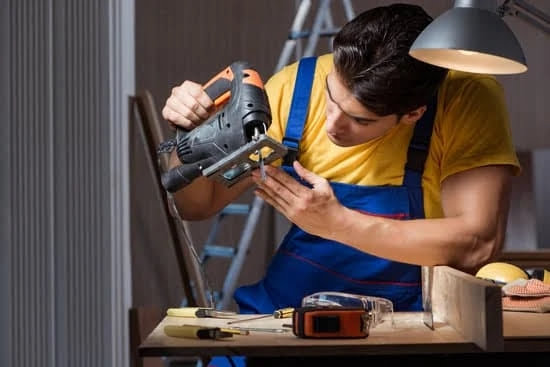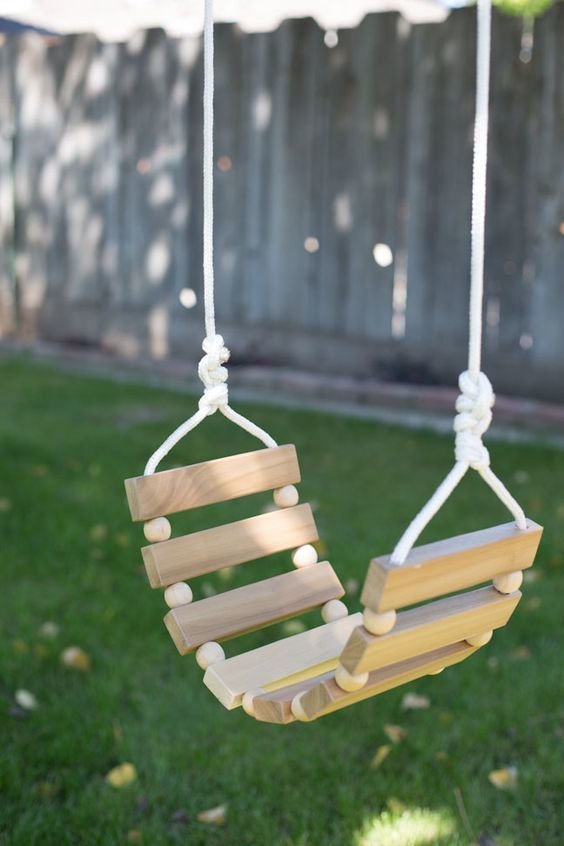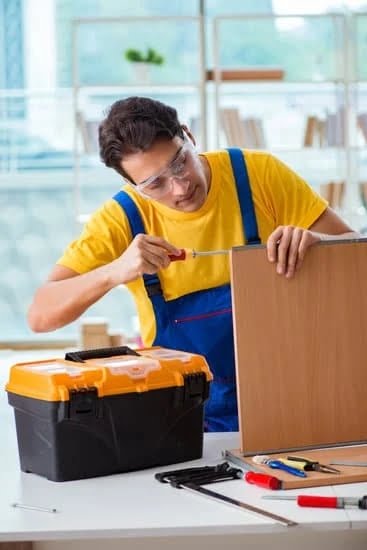Woodworking is a captivating craft that has been gaining popularity in recent years, attracting both hobbyists and aspiring professionals alike. The appeal of working with wood lies not only in the ability to create beautiful and functional pieces, but also in the satisfaction that comes from bringing something to life with your own hands.
Whether you’re a beginner or looking to enhance your woodworking skills, having the right tools is essential. In this article, we will explore the must-have tools that every woodworker should have in their arsenal.
Woodworking offers a world of possibilities and endless creativity. From crafting stunning furniture pieces to building intricate wooden structures, there is no limit to what you can achieve with wood. This age-old craft allows you to bring your ideas to life and create something tangible and lasting. Whether you’re looking for a new hobby or considering woodworking as a profession, it’s important to start off on the right foot by equipping yourself with the necessary tools.
In this blog post, we will guide you through the key tools needed for woodworking success. We will delve into essential hand tools like chisels and saws that are vital for beginners to master their craft. Additionally, we will explore the power tools that can enhance your woodworking journey and streamline your tasks.
Furthermore, we’ll discuss everything from workbenches and sharpening tools to safety gear and measuring devices – all indispensable elements of any woodworking workshop. Stay tuned as we dive into the exciting world of woodworking and discover how these tools can help you bring your creations to life.
Essential Hand Tools for Woodworking Beginners
For woodworking beginners, investing in essential hand tools is crucial to building a solid foundation in the craft. These tools not only allow you to perform a variety of tasks, but they also help you develop important skills and techniques. Here are some must-have hand tools that every woodworking beginner should consider:
- High-quality chisel set: A chisel set is one of the most important tools for woodworking. It allows you to carve and shape wood with precision and accuracy. Look for a set that includes different sizes and types of chisels, such as bevel-edge chisels, mortise chisels, and bench chisels.
- Reliable hand plane: A hand plane is used to smooth and flatten surfaces, making it an essential tool for any woodworking project. Look for a hand plane with a sharp blade and an adjustable depth control feature.
- Versatile set of saws: Having a versatile set of saws is essential for making accurate cuts in different types of wood. Consider investing in a coping saw, crosscut saw, and rip saw to cover different cutting needs.
When selecting hand tools, it’s important to consider their quality, durability, and ergonomic design. Choose tools made from high-quality materials that can withstand heavy use without losing their sharpness or breaking easily. Additionally, opt for tools with comfortable handles that allow for extended periods of use without causing strain or discomfort.
By acquiring these essential hand tools, woodworking beginners can start exploring the possibilities of creating beautiful and functional pieces from scratch. Remember to practice proper technique and safety precautions while using these tools to ensure both successful projects and enjoyable woodworking experiences.
Must-Have Power Tools to Enhance Your Woodworking Journey
When it comes to woodworking, power tools are a game-changer. These tools not only help you complete tasks quickly and efficiently, but they also enable you to take on more complex projects and achieve professional-looking results. Here are some must-have power tools that will enhance your woodworking journey:
- Table Saw: This is often considered the centerpiece of any woodworking shop. A table saw allows you to make straight cuts, crosscuts, miters, and even rabbets with ease. Look for a table saw with a powerful motor, adjustable fence system, and safety features like blade guards.
- Drill Press: A drill press is essential for drilling perfectly straight holes in wood. It offers more accuracy and precision compared to handheld drills. Opt for a drill press with adjustable speed settings, depth-stop feature, and a sturdy construction.
- Jigsaw: This versatile tool is perfect for making intricate curved cuts in wood. It can also be used for cutting shapes on plywood or making cutouts in various materials. Look for a jigsaw with variable speed settings and orbital action feature for smoother cuts.
Before purchasing power tools, consider factors such as motor power, blade options compatibility, safety features like blade guards or emergency stop switches, as well as overall durability and reliability.
Investing in these essential power tools will provide you with versatility in your woodworking projects and open up new possibilities. They will save you time and effort while allowing you to tackle more challenging designs.
Remember to always practice proper safety precautions when using power tools including wearing appropriate protective gear such as safety glasses and ear protection.
With these must-have power tools at your disposal, you’ll be equipped to take on any woodworking project that comes your way.
The Indispensable Workbench
Woodworking projects require a dedicated and well-equipped workbench to serve as the heart and soul of your woodworking sanctuary. A workbench not only provides a stable and secure workspace but also offers storage and organization solutions for your tools and materials. In this section, we will discuss the various features and components that make up an ideal workbench, and provide advice on how to set up and organize it effectively.
One of the most essential elements of a workbench is a sturdy vise that can securely hold your wood in place while you work on it. A high-quality vise allows you to hold pieces at different angles, making it easier to perform tasks such as planing, chiseling, or sawing. Look for a vise with a strong grip and smooth operation, as this will greatly contribute to the success of your woodworking projects.
In addition to a vise, adjustable clamps are another indispensable component of a workbench. These clamps provide extra support when working with larger or irregularly shaped pieces of wood. They can be used to hold boards together while gluing or clamping down joints during assembly. Invest in clamps that are sturdy, easy to adjust, and have enough depth to accommodate various thicknesses of wood.
Built-in storage is essential for keeping your work area clean and organized. A well-organized workbench allows you to easily locate your tools and materials when you need them, saving time and minimizing frustration. Consider adding shelves or drawers underneath the work surface to store hand tools, power tools, fasteners, and other accessories. Pegboards or tool racks mounted on the wall above the bench can also provide convenient storage options.
| Workbench Component | Description |
|---|---|
| Sturdy Vise | A vise that securely holds wood in place for various woodworking tasks |
| Adjustable Clamps | Clamps that provide extra support for larger or irregularly shaped pieces of wood |
| Built-in Storage | Shelves, drawers, or pegboards for organizing tools and materials |
By incorporating these features into your workbench design, you can create a woodworking sanctuary that promotes efficiency, accuracy, and creativity. Remember to personalize your workbench according to your specific needs and preferences. Keep it clean and clutter-free to maintain a clear workspace that fosters focus and productivity. With a well-equipped workbench, you’ll be ready to tackle any woodworking project with confidence and ease.
Sharpening and Maintenance Tools
Woodworking is a craft that requires precision and attention to detail, and keeping your tools in top shape is essential for successful woodworking projects. This section will focus on the importance of sharpening and maintenance tools and provide a comprehensive list of must-have tools for keeping your woodworking tools in optimal condition.
- Sharpening Stones: Sharpening stones are essential for maintaining a keen edge on your chisels, planes, and other cutting tools. Available in various grits, sharpening stones allow you to grind away dullness and restore sharpness to your blades.
- Honing Guides: Honing guides help ensure consistent angle and pressure while sharpening your tools. They hold the blade securely at the correct angle, making it easier to achieve a razor-sharp edge every time.
- Strop Blocks: After sharpening, using a strop block can help refine the edge of your tools even further. A strop block is typically made of leather or canvas material, which is coated with a fine abrasive compound for polishing and honing the blade’s edge.
- Tool Maintenance Kits: Investing in a comprehensive tool maintenance kit can make it easier to keep all your woodworking tools in top shape. These kits often include items like lubricating oil, rust removers, cleaning brushes, and other essentials for regular tool maintenance.
Proper tool maintenance also extends beyond just sharpening. Here are some additional tips for preventing damage and maximizing tool longevity:
- Keep your tools clean and free from moisture.
- Store them in a dry environment to avoid rust.
- Use protective cases or covers when not in use.
- Regularly inspect handles for cracks or splinters.
- Reapply oil or wax finishes to wooden handles as needed.
By dedicating time to maintaining your woodworking tools properly, you can ensure optimal performance and longevity. Whether you choose individual sharpening and maintenance tools or invest in a complete kit, taking care of your tools will pay off in the long run, allowing you to create beautiful woodworking projects with ease and precision.
Safety First
Woodworking is a rewarding and fulfilling craft, but it is essential to prioritize safety and protect yourself while working with tools and equipment. In this section, we will discuss the protective gear that every woodworker must have to ensure a safe working environment.
First and foremost, safety glasses are a must-have item for any woodworker. They protect your eyes from flying debris, sawdust, and other potential hazards. It’s crucial to choose safety glasses that are ANSI-rated and have side shields for maximum protection.
In addition to protecting your eyes, it’s essential to safeguard your hearing. Woodworking can often involve loud machinery and power tools that emit high levels of noise. Investing in ear protection such as earmuffs or earplugs can greatly reduce the risk of hearing damage and provide a more comfortable working environment.
Another important protective gear is a dust mask or respirator. Woodworking creates an abundance of dust, which can be harmful when inhaled. A quality dust mask or respirator filters out fine particles and protects your lungs from potential health hazards.
Furthermore, protective gloves are necessary for preventing cuts, abrasions, and splinters while handling rough materials or sharp tools. Choose gloves made from durable materials such as leather or cut-resistant synthetic fibers to ensure optimal protection.
| Protective Gear | Description |
|---|---|
| Safety Glasses | Protects eyes from flying debris and sawdust. |
| Ear Protection | Reduces the risk of hearing damage from loud machinery. |
| Dust Mask/Respirator | Filters out harmful dust particles, protecting the lungs. |
| Protective Gloves | Prevents cuts, abrasions, and splinters while working. |
By wearing the proper protective gear, you can minimize the risk of accidents and injuries in your woodworking projects. Remember that safety should always be a top priority, allowing you to enjoy your craft with peace of mind.
The Right Measuring and Marking Tools
Importance of Accurate Measuring and Marking Tools
Accurate measuring and marking tools are essential for any woodworking project, as they play a crucial role in achieving precise results. These tools allow woodworkers to take accurate measurements, mark out cuts and joinery, and ensure the overall quality and precision of their work. Without proper measuring and marking tools, even the most skilled woodworker may struggle to produce professional-looking projects.
Various Measuring and Marking Tools for Woodworking
There are several measuring and marking tools that every woodworker should have in their toolbox. One of the most common tools is a tape measure, which allows for quick and accurate measurements of length. Combination squares are another indispensable tool, providing both a ruler and a 90-degree reference edge for ensuring squareness in woodworking tasks.
In addition to these basic tools, it is also important to have specialized tools such as a marking gauge, which helps in creating straight lines parallel or perpendicular to an edge. A bevel gauge is useful for determining angles on pieces that require complex joinery or precise miter cuts. These measuring and marking tools not only contribute to accuracy but also enhance efficiency by minimizing errors and reducing the need for guesswork.
Contributing to Professional-Looking Woodworking Projects
Investing in quality measuring and marking tools pays off when it comes to producing professional-looking woodworking projects. Accurate measurements ensure that pieces fit together properly, resulting in seamless joinery. Precise markings allow woodworkers to make clean cuts at the right locations, resulting in tight-fitting joints or smooth edges.
Moreover, using high-quality measuring and marking tools instills confidence in woodworkers as they embark on their projects. Knowing that they can rely on these tools to provide accurate readings gives them peace of mind during the construction process. The precision offered by these tools allows woodworkers to focus on other aspects of their projects, such as design and finishing, knowing that the foundation of their work is accurately measured and marked.
Supplementary Tools and Accessories for Enhanced Woodworking Experience
While the essential tools mentioned earlier are crucial for getting started in woodworking, there are also supplementary tools and accessories that can greatly enhance your woodworking experience. These tools may not be indispensable, but they can provide added benefits and expand creative possibilities in your projects.
Wood Moisture Meter
A reliable wood moisture meter is a valuable tool to have when working with different types of wood. It measures the moisture content in the wood, which is important for preventing issues such as warping and cracking. By accurately determining the moisture level, you can ensure that your project is being constructed with properly dried wood.
Digital Angle Finder
Achieving precise angles is essential in woodworking, whether it’s for joinery or creating decorative details. A digital angle finder helps you measure and precisely replicate angles with ease. It eliminates the guesswork involved in achieving accurate angles, saving time and ensuring consistency in your work.
Specialized Wood Glues
Wood glues formulated for specific project requirements can make a significant difference in the quality and durability of your woodworking pieces. There are various types of wood glues available, each designed for specific applications such as high-strength bonding or waterproofing. Using the right glue ensures strong adhesion between wood pieces, contributing to the longevity of your projects.
When selecting supplementary tools and accessories, consider their value to your particular woodworking needs and future aspirations. Investing in these additional tools will enhance your woodworking experience by providing more precision, efficiency, and creative opportunities. However, it’s important to prioritize quality over quantity when building up your collection of supplementary tools.
Remember that while these tools can enhance your woodworking journey, they should never replace the foundational hand tools or essential power tools discussed earlier. With a combination of both essential and supplementary tools at hand, you’ll be well-equipped to tackle a wide range of woodworking projects and uncover the joys and fulfillment that this craft has to offer.
Conclusion
In conclusion, embarking on a woodworking journey requires having the right tools at your disposal. Throughout this article, we have explored the must-have tools for both beginners and experienced woodworkers alike. From essential hand tools to indispensable power tools, a well-equipped workbench, sharpening and maintenance tools, safety gear, measuring and marking tools, and supplementary accessories – each plays a crucial role in enhancing your woodworking experience.
Investing in quality tools is key to starting your woodworking journey on the right foot. By selecting tools based on their durability, quality, and ergonomic design, you ensure that they will serve you well for years to come. Additionally, prioritizing safety by wearing protective gear such as safety glasses, ear protection, dust masks, and gloves ensures a safe working environment that prevents accidents and long-term health hazards.
Woodworking is not just a hobby or profession; it is an opportunity for creativity and self-expression. With the right set of tools, you can create beautiful and functional pieces from scratch that bring joy and fulfillment.
So whether you are just starting out or looking to enhance your skills further, remember that your journey begins with the right tools. Take the plunge into this exciting world of woodworking and discover the sense of accomplishment that comes with bringing your vision to life through this timeless craft.
Frequently Asked Questions
What woodworking tools should I get first?
When starting out with woodworking, it is essential to have a few basic tools to get you started. Firstly, a good quality set of chisels is important for shaping and carving wood. Look for chisels that come in various sizes to accommodate different tasks. A combination square is also a valuable tool for measuring and marking straight lines accurately.
Additionally, a coping saw or a fret saw is helpful for cutting intricate shapes or curves in wood. Another must-have tool is a reliable hand plane, which allows you to smooth surfaces and remove imperfections from your projects. Finally, investing in a set of clamps will prove invaluable when it comes to holding pieces together securely during assembly.
What do I need to start a woodworking hobby?
To start a woodworking hobby, there are several items you will need beyond just the tools themselves. First and foremost, find yourself a suitable workspace where you can comfortably work on your projects without the risk of damaging other items or causing accidents. A sturdy workbench is essential as it provides a stable surface for working and helps keep your projects steady during construction.
It’s also crucial to have proper safety equipment such as safety goggles, gloves, and ear protection to ensure your well-being while working with power tools and sharp objects. Additionally, stocking up on quality wood materials appropriate for your desired projects is essential, along with various sandpapers for smoothing surfaces and creating fine finishes.
What is the most useful tool for woodworking?
While all woodworking tools have their specific purposes and advantages, one tool that stands out as especially useful is the table saw. A table saw revolutionizes woodworking by allowing accurate ripping of large stock materials into smaller pieces effortlessly. It offers greater precision compared to other types of saws, ensuring clean cuts without much effort or skill required from the user’s part once properly set up.
The versatility of a table saw further adds to its utility; not only can it rip lumber longitudinally but it can also make crosscuts with accuracy when aided by accessories like miter gauges and sleds. With proper safety precautions, the table saw becomes an indispensable tool in any workshop and is often considered the backbone of many woodworking projects.

Hi everyone! I’m a woodworker and blogger, and this is my woodworking blog. In my blog, I share tips and tricks for woodworkers of all skill levels, as well as project ideas that you can try yourself.





